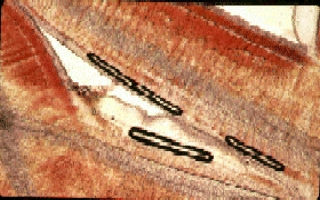 Gas bubble
Disease
Gas bubble
Disease
Total dissolved gas refers to the sum of partial pressure of all gases in solution in a liquid. The principal gases found in culture water are nitrogen, oxygen and carbon dioxide. The quantity of gas that will remain in solution in water is governed mainly by pressure, temperature and salinity. As pressure is increased water will hold more gas in solution. However, as temperature increases water retains less dissolved gas. Less gas remains in solution in saltwater than in freshwater if temperature and pressure are equal. The dissolved gas in fish tissue is in equilibrium with the water surrounding the fish.
 Gas bubble
Disease
Gas bubble
Disease
Gas bubble disease occurs when fish are in water that can no longer hold gas in solution at the ambient temperature and hydrostatic pressure. Gas bubbles form in the water as well as the tissues and blood of the fish. These gas bubbles (emboli) can impair blood flow and/or mechanically damage vital organs. The various symptoms of gas bubble disease are reflected by the locations, degree of tissue damage and functional deficits of gas bubble disease.
Affected blood vessels appear microscopically as discrete areas of gas in the tissues. Gas emboli from gas bubble disease must be distinguished from air trapped in tissue wet mounts during slidepreparation. Gas pockets in gas bubble disease are usually not circular or spherical but will take another form due to the presence of tissues around the gas bubble. On the other hand, gasbubbles are usually circular or spherical when trapped around tissues during preparation of the slide.
Fish affected by gas bubble disease will usually float prior to and after death. Tilapia dying from gas bubble disease will have grossly apparent bubbles in the superficial tissue around the eyes, in the thin tissue between rays of one or all of the fins, on the gill lamellae and elsewhere in the body. Demonstration of gas bubbles in the tissues of tilapia that are dying or freshly dead is clear evidence of clinical gas bubble disease. A saturometer is required, however, to determine the actual level of supersaturation.
Gas supersaturation of water can occur due to:
Physical circumstances (these result primarily in nitrogen supersaturation) including:
1. Water and air are mixed under high pressure by
2. An abrupt increase of water temperature due to heating culture water by
3. Biological circumstances (result in oxygen supersaturation)
The initial step in the management of gas bubble disease is to determine the most likely cause for the supersaturation. If the incoming water is supersaturated the flow should be stopped or at least greatly reduced until the cause of the supersaturation is identified and corrected. One common problem occurs with system designs that have sub-surface entry of the inflow or recirculated water. Without splashing to allow equilibration with the atmosphere, excess gas (if the water is supersaturated) has little chance for release. Often, re-direction of the flow to allow water to enter by splashing will alleviate the problem.
Measurement of total gas pressure in water can be made using an instrument called a saturometer. This instrument measures the change in gas pressure brought about by the movement of gas across a semi-permeable membrane.
| file: /Techref/other/pond/tilapia/gas-supersaturation.htm, 4KB, , updated: 2009/7/13 17:04, local time: 2025/10/30 20:32,
216.73.216.139,10-3-157-36:LOG IN
|
| ©2025 These pages are served without commercial sponsorship. (No popup ads, etc...).Bandwidth abuse increases hosting cost forcing sponsorship or shutdown. This server aggressively defends against automated copying for any reason including offline viewing, duplication, etc... Please respect this requirement and DO NOT RIP THIS SITE. Questions? <A HREF="http://ecomorder.com/Techref/other/pond/tilapia/gas-supersaturation.htm"> Tilapia Topic, Aquaculture Environment, Gas-Supersaturation</A> |
| Did you find what you needed? |
Welcome to ecomorder.com! |
Welcome to ecomorder.com! |
.